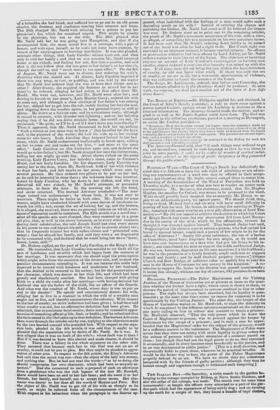PONTSOKEN WA:tn.—The Court of King's Bench has definitively de- cided
that the Aldermen have the sole right of admitting or not admit-
ting any representative of a ward who may be offered to their accept- ance ; and therefore that Mr. Scales cannot compel them to accept him. A meeting of the householders of the Ward of Portsoken was held on
Thursday night, to enisider of what was best to resolve on under such circumstances. Mr. Burrows, the chairman, stated, that lair. Hughes Hughes, the member for Oxford, was meant to be proposed to the ward. What should possibly have tempted the ex-attorney Mr. Hewat to as- pire to an Alderm:tnic gown, we cannot guess. We should think that,. living or dead, Michael Scales and his men will have small difficulty in passing off him for veal. Mr. Scales, in addressing the.meeting- on Thurs- day, remarked with some severity on a very silly observation of Lord Ten- terden's—" He did not intend to criticise the decision to which the Court of King's Bench had come, but one observation fell from Lord Tenter- den in the course of the trial, which he felt offensively, because he thought it was directed against himself. That learned Judge had said, ' Supposing that the electors were to return a person, who had earned his bread by manual labour, would such a person of low origin be fit for the office of Alderman ? ' Surely this great nobleman, the son of a'barber at Canterbury, must have forgotten his own origin, or he would not have tints cast imputations on a man who had got his living by his
dustry, and contributed his mite to support the noble and learned Judge. lie was not, however, dependent on his own exertions f r his livelihood; he was in the possession of a family freehold, amply sufficient to support himself and family ; and he held freehold property between:Aldgate Church and Bow Bridge, of sufficient value to qualify him to take his
seat in the House of Commons for any county in the kingdom." A re- solution to support Mr. Scales in his election was passed unanimously; it seems that already, without one day of canvass, 142 promises have been received.
RELEASING PRISONERS.—The Police Magistrates and the Visiting Justices of the House of Correction are at present at issue on the ques-
tion whether the former have a right, where cause is shown to them, to
shorten the period of imprisonment to persons confined in that or other prisons. The right has always been exercised, but its legality is ques- tionable; at the same time there seems no reason for supposing it to be questionable by the Visiting Justices. The other day, the keeper of the House of Correction waited on Mr. Hardwick, to state the difficultyda which he was placed by the different opinions entertained on the subject; one party calling on him to release and another to retails a prisoner. Mr. Hardwick observed, "That the only power which he knew the Court of Magistrates to possess, was to proceed against the keeper by
indictment for the escape of a prisoner ; and in such a case he appre- hended that the Magistrates' order for the release of the prisoner, would be a sufficient answer to the indictment. The Magistrates of Police were aware that they were not acting with strict legality in giving orders for the release of persons while under execution of a sentence passed pa them ; but though they had not the legal power to do so, they exercised
it occasionally, and in every instance most beneficially to the parties, and in no way detrimental to public justice." [This is a droll doctrine, and
theoretically liable to great abuse, whatever be its practical benefits. It would be the better way to have the power of the Police Magistrates properly defined by an act. We have no doubt they are sometimes tampered with by the friends of guilty parties ; although they may be honest enough and sagacious enough to withstand such tampering.]


























 Previous page
Previous page